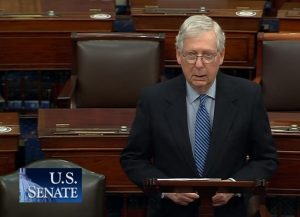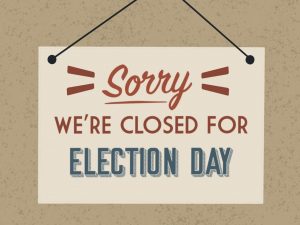The H.R.1 bill was introduced to the 117th Congress on Jan. 4, by Democrat sponsor John Sarbanes, Representative for Maryland's 3rd congressional district, and addresses voting and voter registration among other related issues. The bill has 222 co-sponsors, including Nancy Pelosi (D-CA), Steny Hoyer (D-MD), James Clyburn (D-SC), and Adam Schiff (D-CA). It passed the House on Mar. 3 by a vote of 220-210; if passed in the Senate, the President will have the option to sign it into law.
The bill is called the 'For the People Act of 2021,' but Texas Senator Ted Cruz remarked that "... a more appropriate name would be the Corrupt Politicians Act because it’s designed by the politicians, of the politicians, and for the politicians." The vote among representatives in the House came down strongly partisan, with Mississippi's Bennie Thompson being the sole Democrat vote in opposition, while all Republicans voted against it.
A sponsor-written summary of the bill reads: "To expand Americans' access to the ballot box, reduce the influence of big money in politics, strengthen ethics rules for public servants, and implement other anti-corruption measures for the purpose of fortifying our democracy, and for other purposes," but Rep. Matt Gaetz of Florida said he believes "H.R.1 isn't about elections. It's about power."
Sponsor and author John Sarbanes' issues page describes his reasoning for introducing H.R.1:
"The 2020 election underscored the need for comprehensive, structural democracy reform. Americans across the country were forced to overcome rampant voter suppression, gerrymandering, and a torrent of special-interest dark money just to exercise their vote and their voice in our democracy... It shouldn’t have to be this way.
That’s why House Democrats are committed to advancing H.R.1, the For the People Act—a transformational anti-corruption and clean elections reform package—in the 117th Congress... We will clean up corruption in Washington, empower the American people, and restore faith and integrity to our government. H.R.1 will get us there."
Noted Republican opposition voices paint a different picture. Kentucky Senator Mitch McConnell remarked, "This is clearly an effort by one party to rewrite the rules of our political system... This legislation would forcibly rewrite the election laws of all 50 states from here in Washington," while Ohio Representative Jim Jordan said simply, "Whatever it takes to stop this bill needs to happen... It’s that dangerous."
 Photo: C-SPAN Screenshot
Photo: C-SPAN Screenshot
The bill claims broad Constitutional authority of the Federal government to regulate elections in the States by citing article I, section 4, clause 1 of the Constitution and the Supreme Court decision in Arizona v. Inter-Tribal Council of Arizona, 570 U.S. 1, 8–9 (2013): "Times, Places, and Manner are comprehensive words which embrace authority to provide for a complete code for congressional elections; and [t]he power of Congress over the Times, Places and Manner of congressional elections is paramount, and may be exercised at any time, and to any extent which it deems expedient; and so far as it is exercised, and no farther, the regulations effected supersede those of the State which are inconsistent therewith." H.R.1 also references the 14th Amendment as a basis by which it aims to 'protect the right to vote.'
The bill goes further to justify itself by making the case that access to the right to vote has been intentionally impeded and claims further erosion to be a side effect of racial discrimination. "Excessively onerous voter identification requirements" and "burdensome voter registration procedures" are listed along with "limited and unequal access to voting by mail" and "unequal distribution of election resources" as causes of alleged disproportionate impact on "communities of color." The bill calls the racial disparity in disenfranchisement based on felony convictions "particularly stark."
H.R.1 would require online voter registration accessibility in all States, "assistance with providing a signature," and would require online applications to be accepted on the same criteria as vote-by-mail. In cases where the individual's signature is found to be pre-existing in the state's motor vehicle registry, the acceptance is automated with no safeguards mandated. In new electronic signature submission cases, security measures are left to the state and required only to be "reasonable." Within "miscellaneous provisions," express permission is provided for contributing agencies to contract with third parties to transmit voter registration data.
States would be prohibited from requiring applicants to provide more than the last 4 digits of their Social Security number and forced to allow voter registration forms to serve as an application for an absentee ballot. States would be mandated to "establish and operate a system of automatic registration" in which information gleaned from unrelated State agencies is used to register voters unless the individual affirmatively declines. To auto-register voters, these systems would take identifying information from agencies such as those that administer Social Security Act and Patient Protection and Affordable Care Act programs, those "primarily responsible for regulating the private possession of firearms," agencies that maintain secondary school students' identifying information, and the Social Security Administration. In some cases, the agency would not be allowed to complete the applicant's transaction with that agency prior to obtaining an indication that the individual wishes to register as a voter or affirmatively decline registration.
Individuals eligible to vote would be allowed to register and vote at a polling place on the day of the election, as well as, update or correct information, such as name and political party affiliation. Voters would be allowed to cast a ballot on the basis of that updated information and have that ballot be treated as a regular ballot rather than a provisional one.
Grants would be available for States to "increase the involvement of individuals under 18 years of age" in election activities. The bill appropriates $500,000,000 for States to meet new automatic voter registration program requirements during the fiscal year 2021 and "such sums as may be necessary for each succeeding fiscal year."
 The bill has many more far-reaching implications. It would define Election Day as a legal public holiday, requires disclaimers in certain online political ads, and require States to establish congressional redistricting commissions to carry out redistricting plans created by U.S. District courts. It establishes a 'National Commission to Protect United States Democratic Institutions' in the legislative branch, changes laws related to campaign spending by foreign nationals, prohibits members of the House of Representatives from serving on the board of any for-profit entity. The President and the Vice President will also be required to submit 10 years of tax returns to the Federal Election Commission.
The bill has many more far-reaching implications. It would define Election Day as a legal public holiday, requires disclaimers in certain online political ads, and require States to establish congressional redistricting commissions to carry out redistricting plans created by U.S. District courts. It establishes a 'National Commission to Protect United States Democratic Institutions' in the legislative branch, changes laws related to campaign spending by foreign nationals, prohibits members of the House of Representatives from serving on the board of any for-profit entity. The President and the Vice President will also be required to submit 10 years of tax returns to the Federal Election Commission.
Alarming to voting integrity advocates in favor of stronger paper trails for auditing the vote, the bill mandates that states conducting paper ballot elections cannot preserve ballots "in any manner that makes it possible, at any time after the ballot has been cast, to associate a voter with the record of the voter’s vote without the voter’s consent."
According to Sen. Ted Cruz, "Democrats did not write the Corrupt Politicians Act to strengthen our elections system or to restore trust in our democracy. They wrote it to expand voter fraud and try to ensure that they’ll never lose again... Democrats are gearing up to try to radically transform our election system and lock in majorities at every level of elected government for decades to come... this bill may be the single most dangerous piece of legislation we’ve seen in decades... This bill eliminates countless state election integrity laws, including Texas’ and other states’ voter ID laws, and replaces them with a set of new laws negotiated by Democrat operatives and radical left-wing activists."


